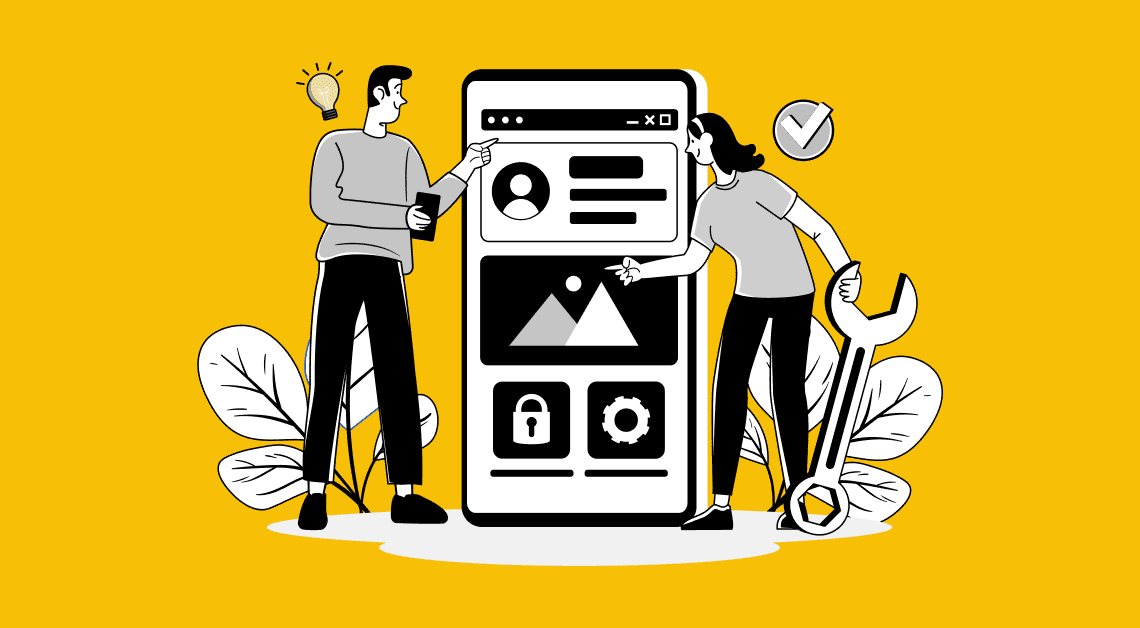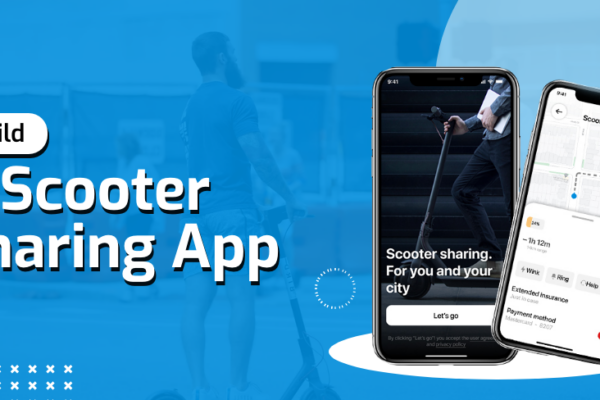Online platforms are transforming the world of traditional businesses into a modern venture. They provide a lot of different services and features that are helping investors and industry professionals grow their business forward and generate huge revenue.
From different online platforms like websites, mobile apps, and software, there is only one that is extensively used and common among people. It is none other than mobile applications. So, industrialists have taken this initiative and started investing their money to build a mobile app for their businesses.
In this blog, we are discussing major aspects that are related to the development of mobile applications. This includes development stages, benefits, and costs superficially. So, let us get into it.
Identify Your Business Domain & Development Niche
Suppose, you are running a restaurant and also selling groceries, so what kind of mobile application you will make for your business? A food delivery, restaurant booking, or a grocery delivery app. It might be a tricky question for you, but as a business investor, you have the option to make a mobile app that may consist of all these services. Additionally, it is mandatory to hire dedicated developers to get the service timely and with standard quality.
It is good to target an audience in large numbers that are within your business’s reach. Let us understand major app development businesses, you can start in different industries:
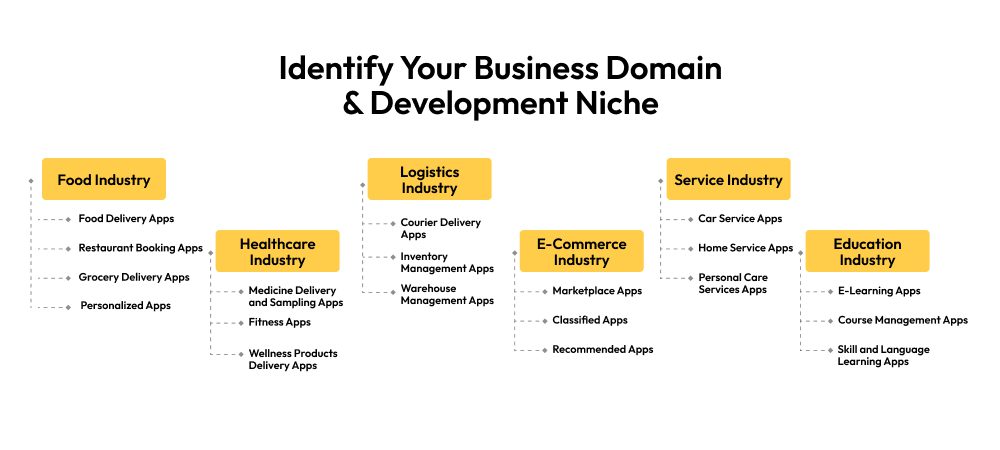
1. Food Industry
- Food Delivery Apps
- Restaurant Booking Apps
- Grocery Delivery Apps
- Personalized Apps
2. Healthcare Industry
- Medicine Delivery and Sampling Apps
- Fitness Apps
- Wellness Products Delivery Apps
3. Logistics Industry
- Courier Delivery Apps
- Inventory Management Apps
- Warehouse Management Apps
4. E-Commerce Industry
- Marketplace Apps
- Classified Apps
- Recommended Apps
5. Service Industry
- Car Service Apps
- Home Service Apps
- Personal Care Services Apps
6. Education Industry
- E-Learning Apps
- Course Management Apps
- Skill and Language Learning Apps
What is the Future of Mobile App Development?
It is expected that the current digital market is going to boom in the upcoming years. Businesses must have a futuristic mindset and be ready to invest in the development of different mobile applications that should be compatible and productive according to the corresponding time. There is no doubt that mobile applications are the need of the upcoming generation.
They are popular and thus it is advantageous for business investors to build a mobile app. Additionally, you must hire mobile app developers who are way ahead of their time and use modern development tools to assist the process efficiently.
The targeted approach should be the development motive of businesses to comply with the users’ needs and make intuitive progress. The market size is also unmatched in comparison with other development and consulting sectors. So, it is the right time for business capitalists to build a mobile application and establish a leading venture in the near future.
Trends of Mobile Application Development in Different Regions
This is very important for businesses to find and observe popular trends in different regions. So, they can easily build a mobile app that can offer immense satisfaction to users and resolve their problems in no time. As a business person, it is very easy for you to identify these regions and the industries they are focused on.
These trends will help you in choosing the right business industry for the development of mobile applications. Additionally, it will also resolve the issue to hire mobile app designers with great supremacy. So, let us move forward and understand what different regions are developing to reshape the future of the world.
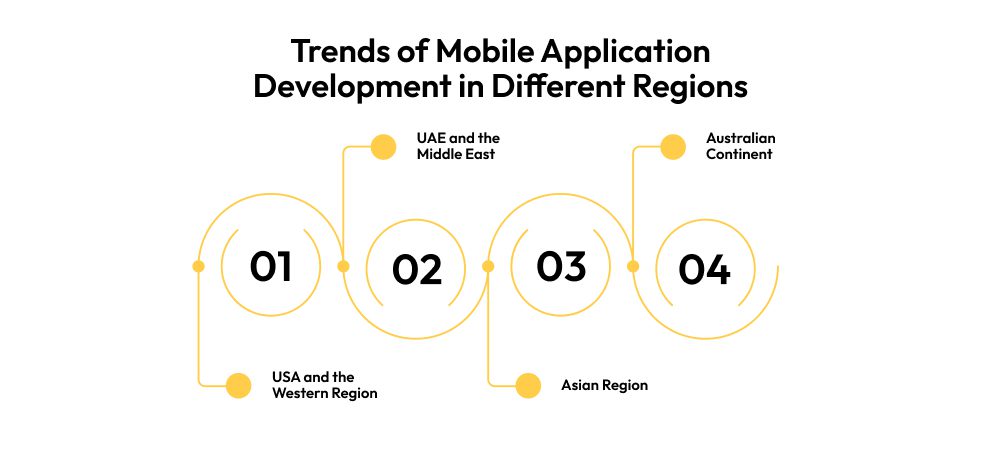
1. USA and the Western Region
- Social media and emailing applications are most popular in the USA and nearby countries with an estimated revenue of $14.6 Billion.
- Secondary applications include fashion and educational platforms that have crossed all the limits and recorded the highest percentage increase in revenue up to 26.7%.
2. UAE and the Middle East
- Gulf countries are known for delivering petroleum and oil services through mobile applications that have made $51,630 Million in revenue.
- Other industries include food and grocery delivery and shopping businesses which are surging with the highest growth in the past 20 years.
3. Asian Region
- Entertainment and online video streaming platforms are popular in Asian countries, with China as the highest revenue-generating country which is $47.3 Billion.
- Additionally, social media, fintech, and travel booking applications are also very strong in this region making India the second most impactful country.
4. Australian Continent
- Messaging applications and video streaming platforms are the most popular and extensive services in this region with a percentage increase of more than 15%.
- Group communication and meeting platforms are the secondary applications that are attracting audiences in large numbers with more than 10 Million.
What are the Major Requirements to Develop a Mobile Application?
Before starting the development process, business investors need to make useful arrangements to reduce the efforts and build a mobile app timely. There are a lot of different things needed to assist industry professionals in building different mobile applications. But, it is not possible to discuss all of them here. So, we will only understand a few in this section.
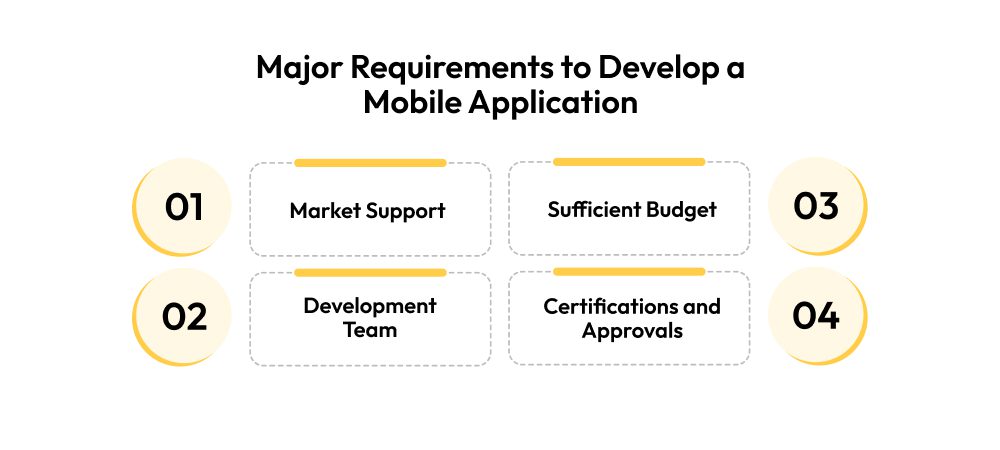
1. Market Support
There must be always a supportive hand present in the development process to make it easy and fast. Without the assistance of business and technical experts, it is not possible to sustain the industry challenges. Once you have established a venture then you can propose your plan to others to find your weaknesses and can work on them later.
2. Development Team
You also need a suitable and experienced mobile app development company that can provide services for developing niche-based applications. This is quite necessary to hire Android app developers through a renowned industrial services provider. So, mobile applications can be made with effective graphics and responsive refresh rates.
3. Sufficient Budget
Businesses need to have a sufficient budget to start the development process. It is a very important resource that allows investors to make a prototype, hire developers, and invest in maintenance services. A low budget can decrease the development speed or even stop the process. So, having the right amount of investment is a must for every business investor.
4. Certifications and Approvals
Getting the required certifications and approvals is mandatory before starting the mobile application development process. You should be officially recognized as a business so that you can deliver trust and ensure transparency. Additionally, it is important to find the answer to how much does it cost to build a mobile application after getting authorized.
How to Build a Mobile App for Your Business?
This is the main section of this blog where we are going to discuss a sequential way of developing mobile applications in detail. It is essential to follow a precise method and apply it accordingly.
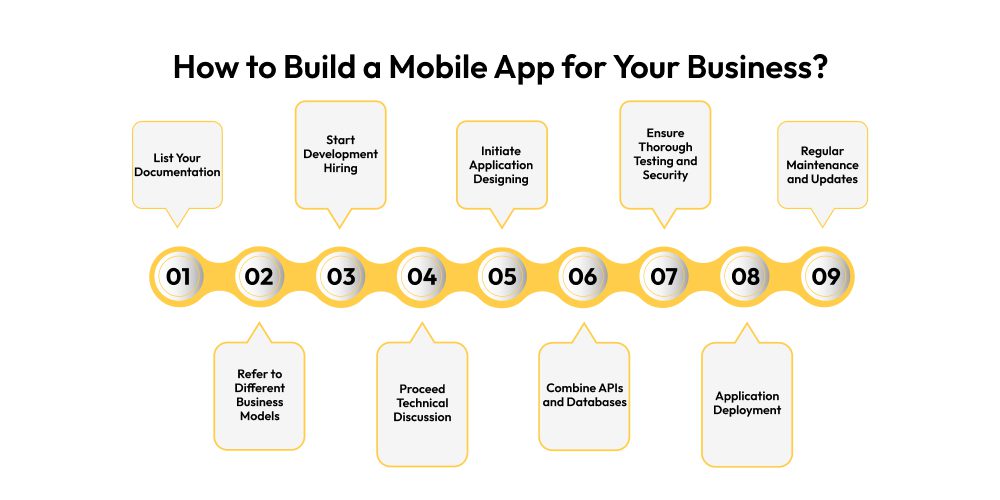
1. List Your Documentation
Businesses must make a proper document that lists budget specifications, application features, Non-Disclosure Agreements (NDA), and security compliances. All these mentionings are crucial in the application development process. So, to accomplish this task you can make an internal team that can provide a detailed outline which should be proposed to the development partner.
2. Refer to Different Business Models
Before starting the development process, you need to gain some fundamental knowledge of the mobile app development process. Additionally, it is quite necessary to discuss the exact app development cost of your mobile platform to manage your budget. So, you must hire Hybrid developers to study different business models and use cases to get sufficient information on various applications.
3. Start Development Hiring
You must find a suitable iPhone app development company to ensure your mobile application is secure. Additionally, following a precise hiring method is beneficial to choosing the right development partner. So, you can start by analyzing their previous performances. Then, it is good to conduct technical interviews to avail yourself of scholastic iOS app development services.
4. Proceed Technical Discussion
Once you have hired a suitable development partner for making a mobile application, you can with your process with an initial discussion on tools and technologies. There are different tools available like Bootstrap for frontend design, Node, and APIs for backend. Additionally, choosing AI, Blockchain or Cloud is also important for a business investor as they are quite expensive and need high maintenance.
5. Initiate Application Designing
Investing money to develop a mobile Android application is quite easy and beneficial. Because it provides the quick infrastructure to implement attractive application interfaces. Designing mobile apps is the first stage of application development. So, you must go through different themes and designs to select the best interface for your mobile application and manage the cost to build a mobile app.
6. Combine APIs and Databases
After implementing a responsive interface, you should now start building a supporting backend infrastructure for your mobile application. So, contact a sophisticated app development company that can provide you with solutions for web apps as well. Additionally, integrating dynamic APIs and databases is important to automate your mobile and web apps.
7. Ensure Thorough Testing and Security
Business investors should know about application testing and security before starting the process of making an industry-based mobile application. So, it is favorable to hire Xamarin developers to detect errors in the application source code. Additionally, using proficient security tools could be beneficial to resolve these errors timely and safely.
8. Application Deployment
When the application is ready to be launched, the first thing you need to do is provide demo services to different people. So, that you can get recognition and that will help you in the application launch process. It is quite necessary to partner with multiple sponsors that can distribute your services to others. But, you need to save budget funds to perform this task without any difficulty.
9. Regular Maintenance and Updates
To provide regular maintenance to mobile apps you need highly specific and efficient resources. So, approaching a hybrid app development company may be suggested to businesses for application support. Additionally, updating mobile applications is also mandatory to ensure the functionality and productivity of the mobile platform. The cost to create a mobile app increases with high maintenance costs.
What Businesses Get from Mobile App Development?
It is important to know the advantages of building mobile applications to be encouraged and prevent the fear of missing out. In this section, we are viewing major benefits of developing mobile apps that businesses can get:
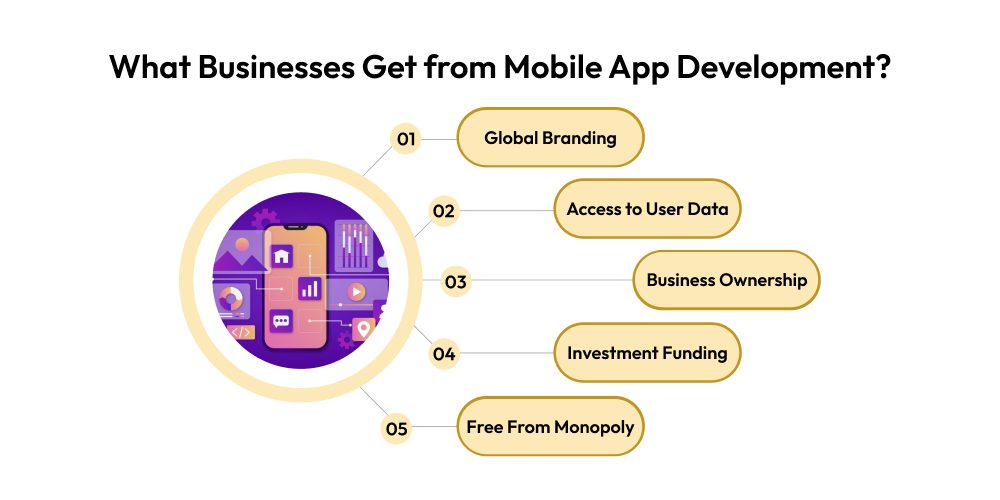
-
Global Branding
As we have discussed mobile applications are the need of the present and future population. Due to their high attractiveness and responsiveness. You can hire Front End developers to impart appealing designs on your mobile apps and make your business brand popular across the globe.
-
Access to User Data
Mobile applications are a source of millions of data. They store the information of every single user and keep it centralized for easy access. Business investors can use this data to improve customers’ experience and also earn high revenue. So, it is highly beneficial to build a custom mobile app with efficient database services.
-
Business Ownership
Investors have the choice to acquire the current market through the development of mobile applications. They can make a single platform to distribute all the services that fall under a particular industry. You can transfer your ownership to other experts for the smooth functioning of your business.
-
Investment Funding
If businesses are targeting public industries like healthcare, food, and e-commerce then they can expect high investment funding. Investors can also hire React Native app developers through these funds which are expensive due to skilled knowledge. Additionally, other industries can also get sufficient funds but their pitch should be catchy.
-
Free From Monopoly
Building your own mobile application can help you stay away from business monopolies so that your business can flourish exceptionally. This is a very common issue among businesses. So, by establishing a startup with a sophisticated mobile app you can play safe in your diversified industry.
How Much Does it Cost to Develop a Mobile App?
The cost is dependent on multiple factors like usage of the development platform and features involved in creating a mobile app. Here, we will observe important factors along with a table representing the estimated cost.
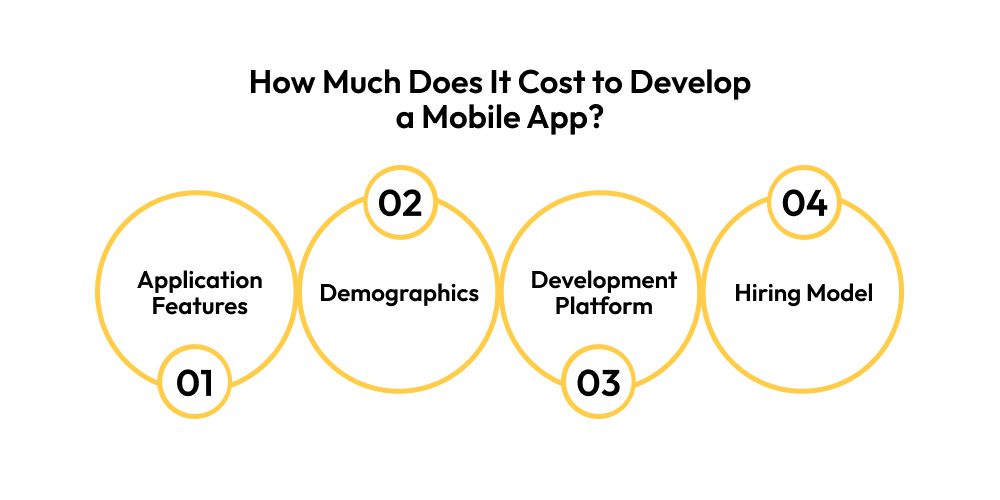
1. Application Features
The features and functionalities play a major role in determining the cost of developing mobile applications. If you hire iPhone app developers to include advanced security and encryption features, then your cost may exceed the proposed budget.
2. Demographics
This is a major factor that highly affects the mobile app development cost. Finding a company in the Western region may be more expensive for business investors than a company in the Eastern region. Additionally, the size of the company also matters.
3. Development Platform
Building mobile applications on different platforms can also influence the cost. Using iOS platforms for advanced services, you may have to pay more amount than Android platforms. So, it is highly recommended to make use of hybrid platforms.
4. Hiring Model
The dependency of cost on the hiring model also creates difficulty for business investors. You can hire Flutter developers through a freelancing model if you have a tight budget. Otherwise, it is beneficial to outreach companies for mobile app development.
The average market cost ranges between $8,000-$14,000 for building less compatible apps. However, it may exceed more than $25,000 because of the implementation of premium and advanced features. Here is an estimated cost structure discussed with the help of a table.
| App Structure | Development Time | Estimated Cost |
| Simple | 5-8 months | $8000-$14000 |
| Moderate | 8-12 months | $14000-$20000 |
| Complex | More than 12 months | $20000-$25000 |
To know the exact cost, you can approach an experienced app-making company. They will provide you with the confirmed outlet with specific budget requirements.
Recall the Blog!!
To make a mobile app a successful enterprise you may require careful design and execution, which is a difficult process. A well-structured data pipeline, large datasets, and high-quality data are all essential components of a successful mobile application.
The importance of establishing a business startup, defining industrial goals, curating data, and utilizing the appropriate technology is highlighted by our proficiency level.
You can hire Offshore developers who follow these guidelines to build mobile applications and are better equipped to take advantage of advanced technologies. They can increase output, foster business expansion, and maintain their leadership position. You can achieve your objectives and fully use your business’s industrial potential by collaborating with sophisticated development services.
FAQs
1. Is it Easy to Build a Mobile App?
- For programmers, to build a mobile application is quite an easy task.
- But, businesses need a development partner for making mobile apps.
- With existing platforms, it is easy to build mobile apps.
2. Can I Make My Own Mobile Application for Free?
- Pre-defined libraries have made it possible to build mobile applications freely.
- It can be used by anyone, even a person having no coding knowledge.
- Various tools are free and provide quality assistance in mobile app development.
3. How to Create a Mobile App?
- Make an initial development plan.
- Hire a mobile app developing partner.
- Start application designing and wireframing.
- Implement backend services and response packages.
- Test and secure your application.
- Convert development into deployment.
- Use maintenance services and provide regular updates.
4. What is the Cost of Developing Mobile Applications?
- The cost is dependent on various factors like application complexity and the demography of the development company.
- It ranges between $8,000-$14,000, for building a simple application.
- The cost may increase to $25,000 or more due to added functionalities.
5. What are the Benefits of Building Mobile Apps?
- High business profit and revenue generation.
- Certified brand marketing at the global level.
- Easily access to users’ data for enhancing their experience.




